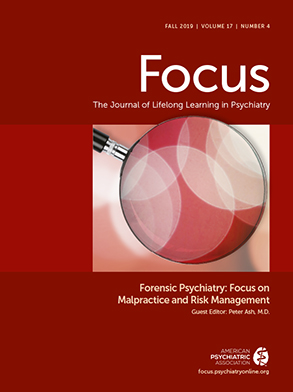I have been treating a 26-year-old woman for major depressive disorder, and she is currently in remission and stable on fluoxetine. She just found out she is 9 weeks pregnant. What is my liability in continuing to prescribe her psychiatric medication in pregnancy?
This is a common scenario for many psychiatrists, and the first, most important thing to do is to change nothing; that is, do not recommend to your patient that she immediately stop or taper off her psychotropic medication. Instead, you should have a conversation with your patient, preferably face to face, about the risks of medication in pregnancy in light of the risks of untreated depression in pregnancy and the postpartum period (
1). The specifics of what you discuss may depend on what your patient wants to know, but generally speaking, common risks and serious complications, even those occurring in <1% of exposed infants, should be disclosed, and the content of what was discussed should be documented in the patient’s medical record. In this case, it would be prudent to disclose that fluoxetine (and other selective serotonin reuptake inhibitors [SSRIs], with the exception of paroxetine) are not thought to carry an increased risk of major congenital malformations above the base rate in the general population (2%–3%) (
2). The common risk of postnatal abstinence syndrome and the rare but serious complication of persistent pulmonary hypertension of the newborn should be disclosed. Although treatment for postnatal abstinence syndrome is generally conservative, out of caution newborns are often observed in the special care nursery, and, infrequently, respiratory support is required (
3). Newborns who display
any symptoms of poor adaptation at birth are cared for by the hospital’s neonatology staff.
Although a woman may not have decided whether she plans to breastfeed early in her pregnancy, the safety of her medication with breastfeeding should also be discussed so she can eventually make an informed decision. In the case of fluoxetine and other SSRI medications, some medication will pass into breast milk, but adverse outcomes for the nursing infant have not been demonstrated. Consequently, these medications are considered safe in breastfeeding (
4). However, as part of a thorough informed consent about both the risks of continuing and stopping medication in pregnancy, it is important to help a woman understand her personal risk factors and treatment history when deciding. For example, the number and severity of her previous depressive episodes might influence her decision. Last, the chart should indicate whether the patient chooses to continue or discontinue the medication and that she made this choice after the aforementioned information was fully discussed.
Although the question was focused on a patient with depressive disorder, it is worth noting that other commonly prescribed psychiatric medications have their own sets of potential risks in pregnancy. Although many medications are felt to be generally safe in pregnancy, some have established, higher risks for complications. These include valproic acid, carbamazepine, and oxcarbazepine, which are all associated with a significantly increased risk of neural tube defects in the developing embryo (
2,
5). Additionally, valproic acid is associated with a significant decrease in IQ (
5). These medications should generally not be prescribed to any woman who is pregnant or planning to become pregnant, unless there is no acceptable alternative. She must also be informed of the risks involved with continuing the medication. Although lithium is known for an increased risk of cardiac malformation (Ebstein’s anomaly), the absolute risk is quite low (
2,
5). Many women have chosen to continue lithium with an enhanced fetal cardiac ultrasound under the guidance of a maternal–fetal medicine physician. Although ultrasound is purely diagnostic and does not prevent cardiac malformations, early identification of a malformation allows the family to identify a pediatric cardiologist with whom they can work on a plan of care for their baby once delivered.
Depending on your level of familiarity with the literature on psychiatric medications in pregnancy and your level of risk tolerance, you may choose to manage your patient’s medications on your own. Alternatively, you may choose to send your patient to a specialist in perinatal psychiatry. Most perinatal psychiatrists are willing to see patients for a one-time consultation or to help a woman manage her mental health through her pregnancy and the immediate postpartum period. The choice depends on whichever the referring psychiatrist and patient feel is most comfortable.
For psychiatrists who are comfortable managing the treatment of pregnant patients on their own, or who practice where a perinatal psychiatrist is not available, a good approach involves a literature search of the medication in question to better understand the perinatal risk. There is an extensive literature on medication treatment for pregnant women (
2,
5–
7), but given that there is near-constant research on psychiatric medications in pregnancy, most reviews are outdated by the time of publication. However, some Web sites provide reliable, evidence-based information. One site that many perinatal psychiatrists use is available from the Massachusetts General Hospital Center for Women’s Mental Health (
womensmentalhealth.org) (
8). This site is updated frequently by clinicians and researchers and is written to be informative to both lay audiences and physicians. Many postings provide links or information to the original research article being referenced. Many perinatal psychiatrists also refer their patients to this Web site to help them further explore their medications in pregnancy on their own.
As a part of a holistic approach to treating pregnant women, it is also important to ask whether they are receiving prenatal care; taking a prenatal multivitamin; and, if indicated, taking additional folic acid supplementation. One should also ask whether they are abstaining from use of tobacco, alcohol, cannabis, and other illicit substances or abused prescription medications. One should also ask about the health of the pregnancy and any gestational complications for mother or baby. Although the health of the pregnancy may seem outside a psychiatric focus, it affects a pregnant woman’s sense of well-being and can have a substantial effect on her mental health. With patient consent, it is also wise to speak with her obstetrician to allay any fears on his or her part and to provide education, if needed. This can minimize the risk that the obstetrician will give the patient a conflicting picture of the safety of psychotropic medication in pregnancy that might create confusion and unnecessary stress early in her pregnancy.
Although treating a pregnant woman with psychotropic medications may induce stress and fears of litigation among psychiatrists, this need not be the case. Women of childbearing age are commonly treated for depression and anxiety disorders, and many will become pregnant, whether planned or not. To minimize risk, the psychiatrist and patient should discuss her personal history, risks of untreated depression and/or anxiety, and risks and benefits of continuing medication in pregnancy. For many women, continuing medication can be a relatively safe and informed decision. Informed consent should be well documented in the chart, including specifically naming any serious complications associated with a medication. Most importantly, it cannot be stressed enough that reflexively telling a pregnant woman to stop her medication without considering her individual history is never the right answer.

